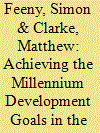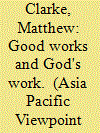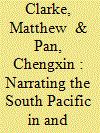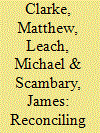|
|
|
Sort Order |
|
|
|
Items / Page
|
|
|
|
|
|
|
| Srl | Item |
| 1 |
ID:
083624


|
|
|
|
|
| Publication |
2008.
|
| Summary/Abstract |
Abstract: The Millennium Development Goals (MDGs) are a set of international development targets agreed to by members of the United Nations in 2000. The goals aim to improve many of the dimensions of extreme poverty and are to be achieved by 2015. This paper provides an overview of the issues relevant to the achievement of the MDGs in the Asia-Pacific region. The paper begins by discussing the critiques of the MDGs before assessing whether countries in the region are on track to achieve them. Issues relating to data availability and accuracy are discussed and the need to tailor the MDG targets to the special circumstances of some Asia-Pacific countries is examined. The paper proceeds by discussing the role of international assistance via international foreign development aid and non-governmental organisations in the achievement of the MDGs. The paper concludes with some policy implications for the international donor community.
|
|
|
|
|
|
|
|
|
|
|
|
|
|
|
|
| 2 |
ID:
084430


|
|
|
|
|
| Publication |
2008.
|
| Summary/Abstract |
Abstract: The Millennium Development Goals (MDGs) are a set of international development targets agreed to by members of the United Nations in 2000. The goals aim to improve many of the dimensions of extreme poverty and are to be achieved by 2015. This paper provides an overview of the issues relevant to the achievement of the MDGs in the Asia-Pacific region. The paper begins by discussing the critiques of the MDGs before assessing whether countries in the region are on track to achieve them. Issues relating to data availability and accuracy are discussed and the need to tailor the MDG targets to the special circumstances of some Asia-Pacific countries is examined. The paper proceeds by discussing the role of international assistance via international foreign development aid and non-governmental organisations in the achievement of the MDGs. The paper concludes with some policy implications for the international donor community
|
|
|
|
|
|
|
|
|
|
|
|
|
|
|
|
| 3 |
ID:
167577


|
|
|
|
|
| Summary/Abstract |
Each year over the last decade, there were on average 400 humanitarian disasters or emergencies, killing more than 100,000 people and affecting a further 200 million. Such humanitarian events require immediate responses as well as effective longer-term activities to aid communities recover. The global response is now valued over US$27 billion annually. More than half a million people are estimated to work in this sector, the majority being locally engaged staff. The international community provides significant resources to assist local communities impacted by these humanitarian emergencies. This aid flows through multiple channels, including national and regional governments, international non-governmental organisations and local community based organisations. Increasing the skills and knowledge of leaders and managers of these responses is a critical need to ensure the most effective recovery in communities as well as use of resources. Understanding the professional journey in the humanitarian sector is vital, but currently limited. As the humanitarian sector continues to expand, greater focus on the skill-set needed by humanitarian workers responding to these events is needed. However, tensions exist between the primacy given to the experiences and soft-skills of humanitarian workers over the value of academic qualifications. This paper provides some suggestions how this tension within the humanitarian sector may be addressed and reconciled. This paper presents new data based on interviews with 20 humanitarian professionals from a range of humanitarian aid agencies and considers their experiences and reflections on building a career within the humanitarian sector.
|
|
|
|
|
|
|
|
|
|
|
|
|
|
|
|
| 4 |
ID:
127128


|
|
|
|
|
| Publication |
2013.
|
| Summary/Abstract |
Eighty per cent of the world's population profess religious faith, making religious belief a common human characteristic found in all cultures and societies. Within development studies' literature and practice, religion and faith have been largely ignored or misunderstood. While religious organisations are primarily concerned with providing spiritual leadership, an interest in the physical welfare of their communities is also a core aspect of their existence. Within Vanuatu, an important community space is the church building with a range of community development activities taking place within it. This case study considers how community development activities are incorporated into the daily ministries of Christian Churches in Vanuatu, including the use of church buildings as the location for these activities.
|
|
|
|
|
|
|
|
|
|
|
|
|
|
|
|
| 5 |
ID:
164764


|
|
|
|
|
| Summary/Abstract |
Beijing’s ambitious Belt and Road Initiative (BRI) has exacerbated a longstanding concern about the power shift from the West to China. The existing debate, however, is both motivated by, and fixated on, the strategic concerns of and about great powers (and to a lesser extent, middle powers). What is often overlooked is the concerns and voices of smaller countries and contested regions where some of the power-shift symptoms allegedly unfold, such as the South Pacific. To traditional donors such as Australia, the power dynamism in the South Pacific is largely a linear, two-way model of power shift from Western donors to Beijing. Challenging this model, this article proposes a complex, three-way model to bring small and seemingly passive actors into the power shift equation. To illustrate, the article uses Papua New Guinea’s (PNG) perceptions of China’s aid vis-à-vis Australia’s aid as a case study. Relying mostly on primary (interview) sources, this study not only reveals some nuanced attitudes of local actors toward the great-power interactions, but also highlights the hitherto neglected role and agency of Pacific Island nations and their domestic politics in the inherently complex power shifts.
|
|
|
|
|
|
|
|
|
|
|
|
|
|
|
|
| 6 |
ID:
186110


|
|
|
|
|
| Summary/Abstract |
Once considered a bunch of “small islands in a far sea” by outside powers, the South Pacific now looms increasingly large on the global geopolitical landscape, attracting the strategic attention of an array of great powers. This has prompted many scholars and commentators to focus on the rise of great power rivalry in the region. Yet, with few exceptions, the existing literature has paid little attention to how the regional dynamics are framed by the dominant narrative of great power politics in the first place and how as a result it has failed to adequately consider alternative voices, concerns and narratives from within the region. This Special Issue aims to tentatively address this neglect by questioning the unreflective narration of regional power dynamics as mere “great power politics” and by highlighting the competing narratives about this region and their policy implications for conducting relations between the South Pacific and “outside powers”. In doing so, it seeks to provide a new critical and self-reflective angle for the debate on the South Pacific. This article first examines the extent to which “great power politics” reflects the reality of the power dynamics in the South Pacific. It then explains why it is important to focus on the theme of narratives and to understand their socially constitutive role in producing knowledge and shaping reality. The third section briefly introduces the five articles in this Issue and outlines their contributions.
|
|
|
|
|
|
|
|
|
|
|
|
|
|
|
|
| 7 |
ID:
123129


|
|
|
|
|
| Publication |
2013.
|
| Summary/Abstract |
Nation-building remains a key challenge in Vanuatu. From the origins of this new nation in 1980, it was clear that creating a unifying sense of national identity and political community from multiple languages and diverse traditional cultures would be difficult. This paper presents new survey and focus group data on attitudes to national identity among tertiary students in Vanuatu. The survey identifies areas of common attitudes towards nationalism and national identity, shared by both Anglophone and Francophone Ni-Vanuatu. However, despite the weakening ties between language of education and political affiliation over recent years, the findings suggest that there remain some key areas of strong association between socio-linguistic background, and attitudes to the nation, and national identity. These findings cast new light on the attitudes of likely future elites towards regional, ethnic, intergenerational and linguistic fault lines in Vanuatu and the challenges of building a cohesive sense of political community and national identity.
|
|
|
|
|
|
|
|
|
|
|
|
|
|
|
|
|
|
|
|
|